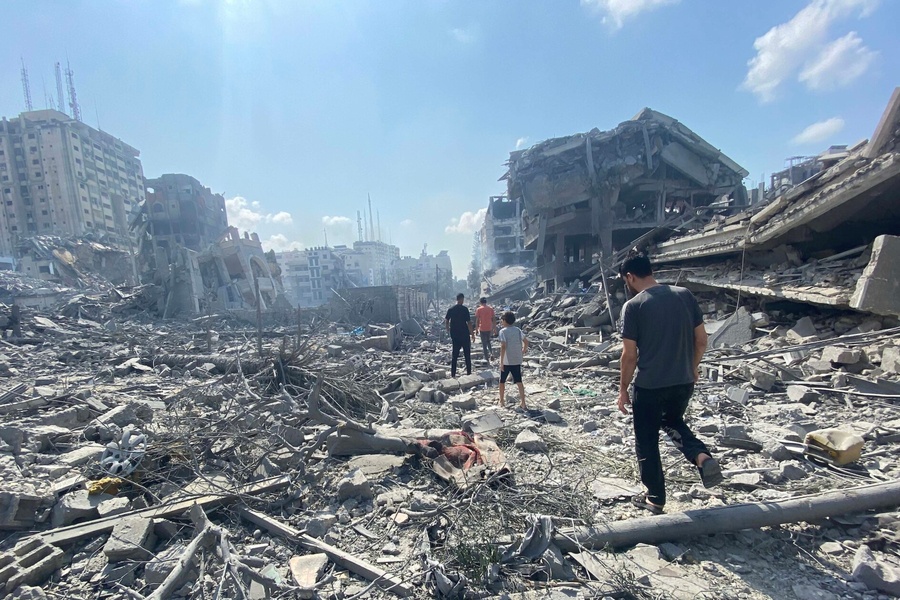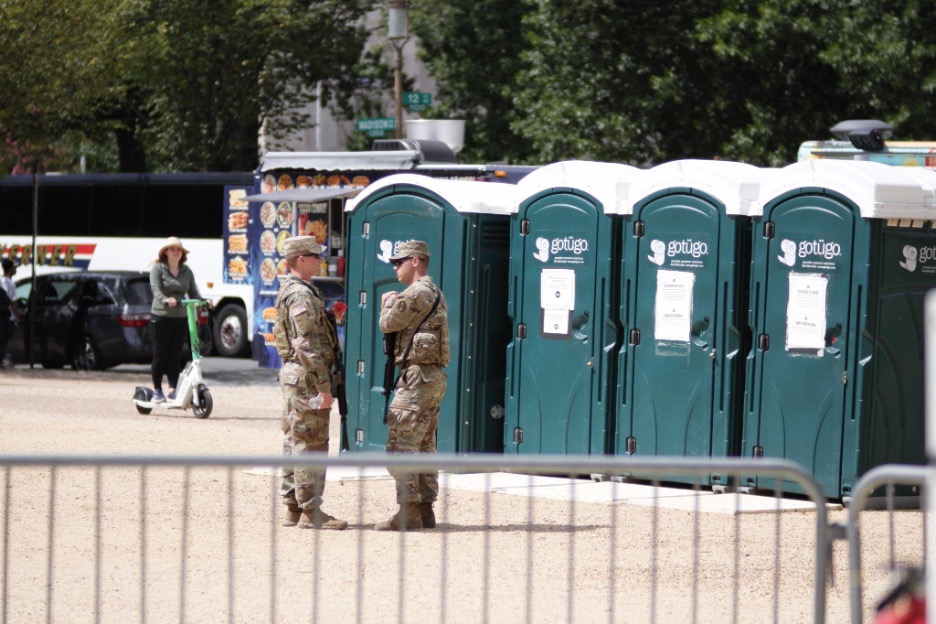The Muslim World and the Challenge of Modernity
The issue of compatibility of Islam and modern liberal democratic values keeps on creeping into the public debate following each terrorist attack and each tragic development in the Middle East, and there have been plenty of them over the last few years to ensure that the debate never falls off radar.
Published by The Lawfare Institute
in Cooperation With

The issue of compatibility of Islam and modern liberal democratic values keeps on creeping into the public debate following each terrorist attack and each tragic development in the Middle East, and there have been plenty of them over the last few years to ensure that the debate never falls off radar. Indeed, ever since the breakout of what has popularly been named the Arab Spring and the assortment of dramatic developments affiliated with it—the implosion of Syria, Iraq and Yemen, the rise of ISIS as a global terrorist threat, and the emergence of the global refugee crisis—popular media, think tanks and an ever growing circuit, if not circus, of pundits and experts have kept the debate going, often at the expense of its quality.
Still, the question of the seeming incompatibility of Islam and modernity, the conclusion that many people seem to reach in this conversation, warrants attention.
Modern liberal democratic values emerged gradually and piecemeal within the context of internal multifaceted developments particular to the Western powers over a period of several centuries. The last two of those centuries, in particular, have been critical. Indeed, Western societies have had ample time to absorb the social and cultural shocks involved in the transition, and while an element of shock therapy—often unintended—was occasionally involved, Western social mores changed slowly and gradually. To be sure, lingering rejectionism and atavistic longings in some circles sometimes express themselves in violent forms, and they still come as indications that the battle is far from being settled. Still, the West has made big strides in embracing liberal values associated with modernity.
What helped facilitate this development as well was the fact that the processes of modernism in the West were driven purely by internal dynamics, which expressed themselves through familiar languages and institutions. The role of external input into this development was minimized centuries earlier. The West’s liberalization did not take place as a result of contact or competition with other societies. For the most part, Western societies dealt with modernization from s position of strength and leadership, and modernity served to empower the West and reinforce its feeling of superiority vis-à-vis other societies and cultures. As popular awareness of this link grew stronger, through improved education and the increasing role of mass media, so did the popular embrace of modern values.
Embracing modern liberalism from a position of political, cultural and economic weakness, on the other hand, is hard. Some countries—Japan and South Korea, most notably—have done it relatively successfully. But it’s a wrenching process under the best of circumstances. In the case of Muslim-majority countries, the dynamics of liberalization have been radically different from those in the West. Modern values did not emerge as a result of organic internal processes, but as a result of contact, often violent, with the West. It came as the product of various acts of imposition inspired by or, on occasions, directly supported by, Western powers. In a sense, rather than leading to an overall sense of popular empowerment, modern values seem to come at the Muslim world’s expense, especially in the political and economic realm. Moreover, the modern values system came as a whole package deal, an already highly-elaborated system of rules and norms. Concepts such as citizenship, parliaments, elections, women’s rights, homosexual rights, and freedom of religion and speech were introduced into Muslim societies simultaneously or within short intervals of one another, giving people little time to absorb the shocks often involved.
Still, Muslim-majority societies and countries have been dealing with the challenges posed by modern values for more than a century now, and the increased levels of violence at this stage indicate how threatened adherents of fundamentalism and traditionalism feel, and how deep have been the inroads made by Muslims who have adopted the modernization agenda. This progress has been achieved despite tremendous setbacks, including the failure of liberalism and nationalism in the design of key states, and the rise of mafia-like regimes which, despite speaking the language of modernization at times, are more interested in transforming their countries into private fiefdoms than in real modernization or secularization as such.
Global geopolitical dynamics leading to the two world wars, the Cold War, and the Global War on Terror have involved repeated acts of direct and covert intervention in the region, and they continue to impose on the region’s political, economic and intellectual elite, greatly complicating the modernization project.
Another complicating factor results from the intimate connection between modern values and Western culture. Indeed, considering the geographic and cultural realities surrounding the birth of modernity and liberalism, the process of modernization calls by its nature for a great degree of Westernization as well—a fact that unsurprisingly fosters certain feelings of resentment and inferiority among many Muslims, irrespective of their educational backgrounds. Politically, this situation has contributed to the unceremonious defeat of liberal forces at the hand of leftist and Islamist counterparts, both of which reject in their different ways modern liberal values.
Indeed, by embracing anti-Western ideologies—despite the fact that this step itself is inspired by the writings of Western authors—the Muslim Left, its secular trappings notwithstanding, repudiated a core commitment to democracy and supported the establishment of various autocratic regimes. These regimes were supposed to bring a measure of social justice, but they broke the society instead, and they thus facilitated the rise of Islamist movements in reaction. Even when the Muslim Left ended up rediscovering the importance of democracy, it did so without appreciating the necessity and usefulness of political engagement with Western governments; it’s still a profoundly anti-Western movement. As a result, the Muslim Left remains incapable of reaching compromises and working arrangements with Western governments, and this weakens its position as an alternative both to existing autocratic regimes and to Islamist movements alike. For a short while, the Arab Spring phenomenon seemed about to alter these dynamics, but regional rivalries, Russian influence, and the conflicting stances of the Obama administration combined to strangle a more productive engagement in its crib.
And so, despite the fact that the embrace of modern liberal values is the step that Muslim societies need to undertake in order to empower their peoples and facilitate their own national and regional development, the manner with which these values continue to be introduced into play—that is, through the auspices of a privileged, Westernized elite, and as a result of some pressure from Western governments—continues to make this development a tall order for the foreseeable future.
This is a classic Catch-22 situation. Since we cannot completely divorce modernity from its Western trappings, or seek its introduction to Muslim societies without the involvement of Westernized elements, attempts at modernizing Muslim-majority countries continue to fail. Yet the involvement of Western support and Westernized elites continues to be the very recipe for that failure.
The solution? Keep trying and experimenting with different approaches, even at the cost of repeated failure.
For, in reality, no failure is complete. Much of the Muslim World has been modernized, and yes, that means Westernized, over the course of the Twentieth Century. A process of internalization of modern values has been underway since the beginning of contact between the Muslims World and the modern West. And in some places, it has borne fruit. Tunisia and Indonesia, for example, have made remarkable progress. It’s easy to lose sight of that progress in the face of spectacular failures like Egypt, Libya, and most appallingly, my native Syria. But that doesn’t make those successes less real.
Considering the elements of foreignness, alienation and resentment involved in change, it is bound to come in fits and starts, and the overall process is bound to be violent and unequal, affecting different Muslim societies at different rates and in different ways. Some societies and states will not be able to cope, and will implode spectacularly under mounting pressures and contradictions. In this hyper-connected world, Muslims will not be the only ones affected by such developments, so global and regional powers have to agree on ways to handle the aftermath. The current inability on part of governments in powerful countries around the world to recognize that certain “local” developments are bound to have global consequences poses a serious security challenge to the current order.
But the ultimate price for delaying modernization in Muslim-majority countries will be borne mostly by Muslims, and though there will always be blame to go around, the ultimate responsibility for this state of affairs still falls on the shoulders of the Muslim elites.
On the bright side, and for all the violence that it has inadvertently unleashed, the phenomenon that came to be known as the Arab Spring actually represents a major step in the modernization processes of many Muslim-majority countries, and its effects are bound to go global. Secularism, women’s rights, homosexual rights, atheism and heresy have once again become part of an open public debate that is unlikely to disappear anytime soon. Despite all of the difficulties and setbacks, it’s clear now that there is a solid constituency out there that has embraced modern values and others that have made tremendous strides in this regard. These constituencies may not win the day at this stage, at least not in regard to all of the issues involved, and many of their most vocal spokespeople might end up in exile in countries, in prisons, or in refugee camps around the world. But, in this day and age, distance hardly consigns the determined to irrelevance. Change might be slow but it will not be stopped. The violent nature of the current struggle should not blind us to the progress already made or to the fact that we seem to be heading in the right direction despite all setbacks. In due course, most Muslim-majority societies will come to terms with modernity to the benefit of all. The people taking part in the current debate about Islam should bear this in mind.




-(1).png?sfvrsn=dd820f87_5)
